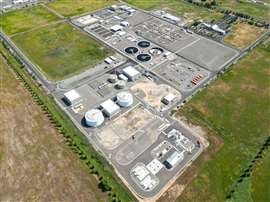California treatment plant to produce renewable fuel for solid waste trucks
07 June 2023
In an effort to decrease greenhouse gas emissions and minimize landfill waste, the city of Roseville, Calif., is converting its trash and recycling vehicle fleet to run on renewable natural gas (RNG) by transforming the region’s wastewater treatment plant into a waste-to-energy facility.
The Pleasant Grove Wastewater Treatment Plant (PGWWTP), owned and operated by Roseville, has undergone an expansion since 2020 to increase the facility’s capacity from 9.5 million gallons to 12 million gallons of wastewater per day to accommodate the area’s population growth.
The PGWWTP also supplies more than half of the 1 billion gallons of recycled water the city delivers annually for landscaping and industrial purposes.
 Roseville, Calif., is converting its trash and recycling vehicle fleet to run on renewable natural gas (RNG) by transforming the Pleasant Grove Wastewater Treatment Plant. (Photo by Brown and Caldwell)
Roseville, Calif., is converting its trash and recycling vehicle fleet to run on renewable natural gas (RNG) by transforming the Pleasant Grove Wastewater Treatment Plant. (Photo by Brown and Caldwell)
“We have come full circle with managing our integrated utility service to benefit our community,” said Richard D. Plecker, Roseville’s Environmental Utilities director. “Through this project, we have the opportunity to generate environmentally beneficial by-products, mitigate the impacts of climate change, comply with regulatory obligations and safeguard the interests of our ratepayers by stabilizing fuel costs for our solid waste fleet.”
Roseville hired environmental engineering and construction services firm Brown and Caldwell to design the renewable biofuel production facility to coincide with expansion works.
The city also installed two new anaerobic digesters at the plant to stabilize wastewater solids generated in the treatment process and generate a sustainable fuel source.
Crews constructed a receiving facility to accept high-strength organic wastes (fats, oils and greases) directly into the anaerobic digesters to maximize digester gas production for RNG conversion and divert up to 12,000 tons of high-strength organic waste per year from landfill.
Four microturbine cogeneration units produce electricity to help power the gas conversion process and provide heat for the anaerobic digesters.
By running its solid waste collection fleet of almost 50 trucks via a new on-site RNG fueling facility and ceasing diesel use, Roseville will reduce greenhouse gas emissions by about 7000 metric tons of CO2 equivalents per year, equal to planting more than 270,000 trees.
The city will also earn credits through the Low Carbon Fuel Standard program as it lowers NOx emissions by 5 metric tons per year.
Generating electricity with microturbines made the project eligible for the Clean Water State Revolving Fund Green Project Reserve, which incentivizes projects that address water or energy efficiency and reduces costs for utility customers.
“We applaud the city for its vision and follow-through in transforming its wastewater treatment process into a highly sustainable, energy-efficient operation,” said Adam Ross, Brown and Caldwell vice president. “Our team is honored to help position Roseville as a model waste-to-energy pioneer by improving the environmental and financial sustainability of the Pleasant Grove Wastewater Treatment Plant.”


